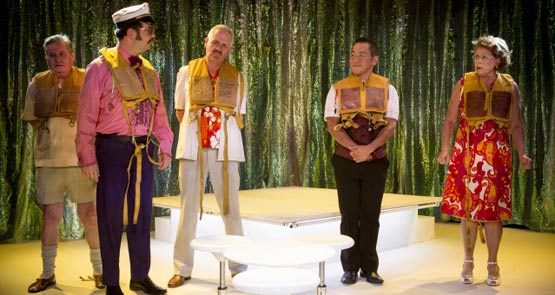
Sam Strong returns from Melbourne Theatre Company in his role as associate artistic director to his former home at Griffin to direct this 1974, new-wave play. This ’70s movement in theatre brought the Australian voice to the stage and for the first time we saw and heard ourselves reflected like never before.
The Floating World speaks about the effects of the last world war on the diggers, long after the event, through the story of Les Harding (Peter Kowitz) and his wife Irene (Valerie Bader), as they travel on the vamped-up former troop ship, on the Women’s Weekly Cherry Blossom tour, towards Japan. It becomes apparent through the course of the play that Les was a POW during WW2 and as he sails towards his destination the memories of his past become too much to bear and the world he’s floating in becomes changed irreparably.
But the floating world, or Ukiyo-e, is also a Japanese artform, producing works between the 17th and 20th centuries. Novelist Asai Royoi wrote about it:
“Living only for the moment, turning our full attention to the pleasures of the moon, snow, cherry blossoms and maple leaves; singing songs, drinking wine, diverting ourselves in just floating; refusing to be disheartened, like a gourd floating along with the river current. This is what we call the floating world.”
It’s interesting to consider this as we delve into Romeril’s play. Les Harding is in his own floating world. He has, up until now, not felt the brunt of damage the war has tolled, but as he heads towards Japan and his past, his drinking and rancid humour won’t quash the memories that become his undoing. What looks like a swell trip becomes a lament on the repercussions of war and Les’ experiences too overpowering to ignore.
At the same time, this is a rollicking, fun, fast-paced production, with quirky monologues and humourous interludes set in the fashion of the ’70s. It’s a great cast, with a larger-than-life entertainment officer played by Justin Smith. His muso, one man band Justin Stewart Cotta, who plays Harry, provides boom-tishes to cue the punchlines to risque jokes. Shingo Usami plays a waiter and trigger to Les’ delirium, while Tony Llewellyn-Jones is a toffy British naval Vice-Admiral unwittingly underscoring Les’ self-awareness of under-achievement. Valerie Bader is a fine, stolid Australian woman, who tickles us with mondegreens, as in thinking Gurkas are gherkins, or Muslims muslins.
But it’s Peter Kowitz, as Les, really rises to the occasion, as his mind descends into no man’s land, culminating in a reckless, demented soliloquy. His acting becomes positively athletic and it’s clear his performing muscles are up for the devastating task of taking us into his mind and pushing us out again, spewing not so much from drinking or lack of sea legs, but the lingering maladies of war. It used to be called shell shock; now PTSD. But about the only intervention in those days was a notional word of advice: just get on with it.
The entire play rang with crude reminders of a crude time that really was cringe-inducing, with its derogatory gags and backwards, parochial nature that, in a way, I’d prefer remained in confined to our not-so-proud past. Wisecracks weren’t wise, but merely cracked: lame and demeaning; making me groan as I unwillingly relived this time of gross cultural cringe. In the ’70s, even while the warm embrace of multiculturalism was hawked, we remained rooted in a barely post-colonial mindset of “she’ll be right, mate!”; squattocratic dwellers in the lucky country trod mindlessly on those beneath, in a more hellish melting-pot of racism, sexism and xenophobia.
But although this play sits strongly within the past in language, tone and design, the strength of the performances lift it to today’s stage with, at times, cheesy, over-the-top crassness and corniness now more readily associated with parody, as in Kath and Kim. But perhaps such behaviour is the last refuge and outlet for the shellshocked soldier, whose mental and emotional wounds were (and, probably, are) left to slowly but surely fester, under the harsh Australian sun. Les has, literally, been “in the wars” and, whatever else it does, Romeril’s play holds steadfastly true to this idiom.
It is, very much, the story of war, as war, at once, desensitises us from the outside, while demoralising, demeaning and damaging us on the inside. These personal stories and the effects of war must be remembered. Lest we forget. Les’ may not be our story, but it might be our grandfather’s.
The details: The Floating World plays Griffin’s SBW Stables Theatre until November 16. Tickets on the company website.







Crikey is committed to hosting lively discussions. Help us keep the conversation useful, interesting and welcoming. We aim to publish comments quickly in the interest of promoting robust conversation, but we’re a small team and we deploy filters to protect against legal risk. Occasionally your comment may be held up while we review, but we’re working as fast as we can to keep the conversation rolling.
The Crikey comment section is members-only content. Please subscribe to leave a comment.
The Crikey comment section is members-only content. Please login to leave a comment.